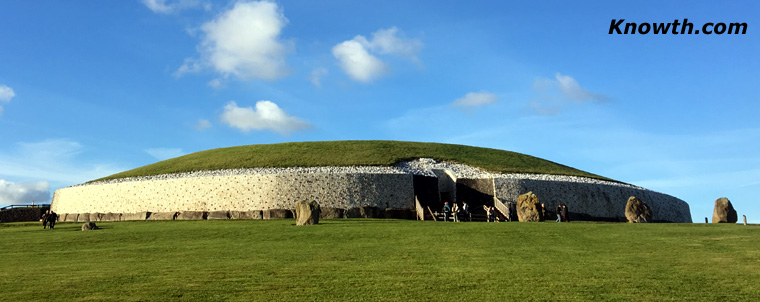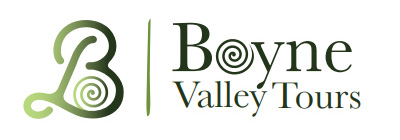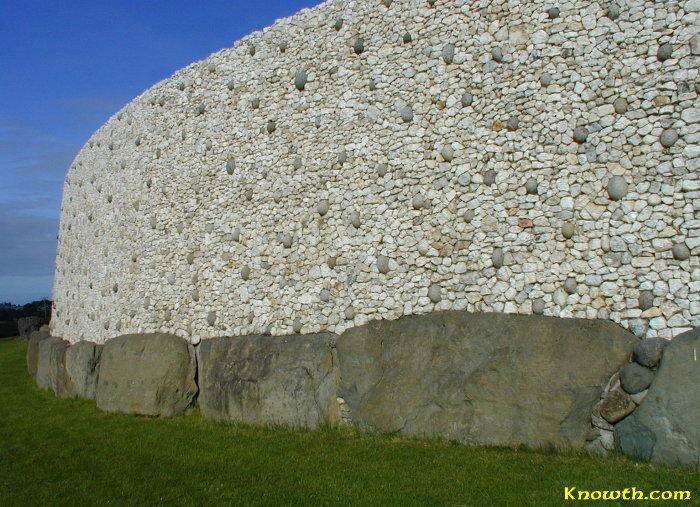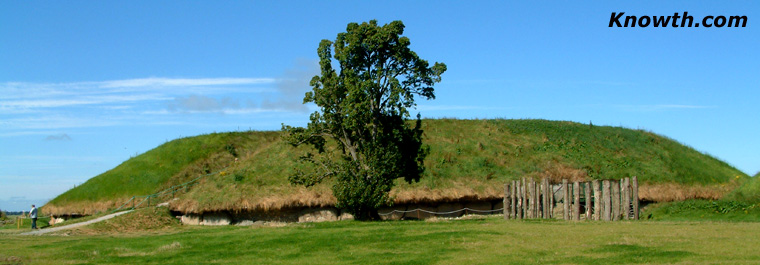Newgrange: empowering the salmon of wisdom by Philip Coppens

The megalithic mound of Newgrange sits along the River Boyne
Newgrange is considered to be the most complex megalithic site in Ireland - and Europe. But despite the enormous focus on its solar display, little else is known about the framework in which the site was developed.
It is said that one of the most spectacular phenomena to witness is the midwinter sunrise lighting up the interior of the passage grave at Newgrange. In Egypt, the Temple at Abu Simbel, built for Ramses II, incorporated the same "light show", occurring at Ramses II's birthday. When the temple was lifted to higher grounds when Lake Nasser and the Aswan Dam were created, the engineers made sure that the phenomenon could still be observed. Today, thousands of tourists still gather to watch one of the great sights in Egypt. At Newgrange, only a handful, lottery-picked people are invited to attend the phenomenon, which is visible two to three days each way from the solstice. For the absolute majority of tourists, the only manner in which the phenomenon is visible is by switching off the electric lights inside, and recreate the sunlight by a directional spotlight.
The megalithic mound of Newgrange sits along the river Boyne and is part of Ireland's best known sacred complex, known as Brú na Bóinne, the "Bend of the Boyne". Why here? The river Boyne, or Boand, means White Cow and as the White Cow Goddess, the river is said to reflect the heavenly river, the Milky Way. This "Avenue of the Dead" was also a physical boundary, between the provinces of Ulster and Meath. Furthermore, the waters of the river Boyne were also said to offer the gift of second sight, showing not only its sacred but also initiatory power.
Newgrange is impressive, but not overly impressive, even though an estimated 200,000 tons of granite stone from Dundalk Bay, plus white quartz from the Wicklow mountains, were used to create this cairn. It was surrounded by a circle of standing stones, of which only twelve of a probable 38 remain. What has made the site spectacular is the fact that the designers allowed for an intricate solar show. However, it is less known that this light show is not limited to Newgrange, but involves various other cairns in the complex also. After Newgrange, the sun enters a number of satellite cairns during the day, until it enters the large cairn of Dowth at sunset. One of these smaller cairns, known as cairn K, harbours the sun at midday. This means that the sunbeam is constantly contained within a cairn throughout the shortest day of the year - as if "loosing" it could mean it would never be found again. Newgrange is therefore merely the "introduction" to a spectacle that lasts the entire shortest day of the year, with the finale at Dowth.
Where does this leave Knowth, the third large cairn in this bend of the Boyne? Knowth is actually the largest cairn in Ireland and was built 500 years before Newgrange. Yet despite these two important qualifying characteristics, it has less mythology connected to it than Newgrange. Still, Knowth equally has a solar light show; its passage is illuminated at sunrise on the equinoxes (March 21 and September 21). Knowth is also known to house a calendar stone, namely kerbstone 52, also known as SW22. On it are a group of crescent shapes arranged around the large boulder.
Some criticism has been directed towards the interpretation of this stone's carvings as a lunar calendar. Still, at present, the consensus is that the stone records a calendar. The stone's petroglyphic symbols thus suggest that the ancient Irish astronomers might have been able to synchronise the lunar cycles with the solar year. Gillies MacBain further observed that the great mound at Knowth has a kerb of 127 boulders, which is half the number of tropical moons in the Metonic cycle. Seeing they were able to perfectly align Newgrange to the midwinter sunrise, similar knowledge about and incorporation of lunar phenomena should not perplex anyone.
Newgrange and the salmon of wisdom
But back to Newgrange. Author Hugh Kearns has suggested that when the sun penetrated the passage of Newgrange, the sun struck a gold disc that hung inside. There is no archaeological evidence for this, but let us continue in this speculation. He believes that the refracted light would then strike the Boyne river. Kearns tested his thesis on a 1:24 scale model, which backed up his findings. But it does rely on the presence of a disc, of which there is no evidence. The scenario itself seems unlikely, but what is known, is that while the sun penetrated into the passage, the same rays would hit the white quartz of the mound, making it glow in the early morning light. Kearns also believes that the event was accompanied by music, so that Newgrange was a "sound and light" show. His conclusions have independently been backed up by research by Paul Devereux, who investigated the features of Newgrange. He did an acoustical analysis of the structure, which showed that there was indeed an ancient sound and light show.Despite the above unfounded speculation, Kearns does point out that vast numbers of salmon span in the Boyne Valley at the time of the winter solstice. Salmon were consulted by Celtic heroes for their wisdom and forethought; to eat a salmon, or Eo Feasa, was to gain immediate knowledge. They are incorporated into many myths: Gwyrhr questioned a series of wise animals, each one wiser than the previous.
The oldest and wisest of all was the salmon of Llyn Llyw. Cúchulainn used the hero's salmon leap across the Pupils' Bridge to get Scáthach's stronghold in order to gain access to Scáthach's advanced knowledge of arms. To gain the secrets, Cúchulainn had to use the hero's salmon leap to Scáthach herself in order to gain the secrets reserved for her family. Eating salmon was believed to enhance knowledge and intellect. Let us note that the water of the river itself was believed to enhance second sight. Thus, drinking the water and eating the salmon of the river Boyne would allow the initiate the gain knowledge of the Otherworld. It would suggest that the presence of the salmon at the winter solstice identified the site as sacred in nature, which in later millennia resulted in the area becoming a religious centre, into which the various cairns were constructed, whereby the sun penetrating into the passages and being "caught" on the sacred day was just one aspect of a much larger and older religious experience.
Apart from salmon, the site was linked with the Boand, the Cow Goddess. The location is known as the "Bend of the River of the White Cow Goddess". Of course, the cow is the origin of milk, and hence it is a short step from Milky Way to "Track of the White Cow". But what could it mean? The salmon returns to its place of birth, so that itself can create new life. The river Boyne is one such location. The salmon was identified with knowledge and mankind strives for divine knowledge, which was believed to come from the stars, the realm where the shamans - those with second sight - went. Was capturing the sun on its shortest day a symbolism of how the "power of the sun" was captured in this bend of the river Boyne, the power of which was then somehow "transposed" onto the salmon? Those who consequently ate the salmon would acquire "divine knowledge", through the mediation of the solar light.
The Milky Way, and the river Boyne, was therefore a path of enlightenment. The salmon was the shaman, the traveller, in search of his origin, but also of his destiny. The salmon supposedly gained its knowledge by consuming the nine hazel nuts of wisdom that fell into the Well of Segais, the primary source of all knowledge in Celtic lore. Nechtán was one of the guardians of the well, along with his brothers Flesc, Lám and Luam. No-one but they were supposed to go to the well - not even the gods. However, just like Adam could not control Eve with the serpent, Nechtán's wife Boand decided that she would disobey the command. As a result, the knowledge of the "Fountain of all Knowledge" sprang over into our realm - echoing the story of Adam and Eve even further.
Once the water was gushing into this dimension, it could no longer be stopped; the Boyne River was born. It should not come as a surprise that like Adam and Eve, there were repercussions. In one account, she was drowned because of her, in another she lives but is crippled ever after. Still, the river Boyne was named after her. It is clear that she is a perfect symbol for the shaman, who goes in search of knowledge in the Otherworld, but brings it back with him - thus spilling the knowledge of the divine into our realm. The path the shaman travels is often identified as the Milky Way, and we note Bóann is not only identified with the river Boyne, but also with the Milky Way. Finally, William Battersby, author of "The Age of Newgrange" states that Nechtain, Bóann's husband, is identified as the constellation Orion. Nechtain was nicknamed "silver arm" because his constellation has an upraised arm. Orion was often believed to guard the Milky Way.
What does this mean for Newgrange, Knowth and Dowth? The waters from the Well of Segais created the river Boyne in Ireland, on whose banks sit the mighty mounds of Brú na Bóinne (Newgrange), Cnogba (Knowth), and Dubgad (Dowth), where some of the Gods were said to live. Boann herself was said to have lived in the Brú na Bóinne. Nna Bóinne means the river Boyne, and Brú means an otherworld palace or festive hall, existing in an eternal timeless realm of the supernatural and not as a place of human habitation. The mounds were therefore seen as houses of the gods. Most likely, the gods were personified as sacred stones, no doubt long since removed to other locations or lost. The stones on which the sun shone on the winter solstice or the equinoxes were no doubt seen as entrance into another dimension, where the gods truly lived. What remains today are thus merely the empty - vacated - houses of the god, even though each year, the sun continues to go in search of its divine relatives.
Boyne Valley Private Day Tour
 Immerse yourself in the rich heritage and culture of the Boyne Valley with our full-day private tours.
Visit Newgrange World Heritage site, explore the Hill of Slane, where Saint Patrick famously lit the Paschal fire.
Discover the Hill of Tara, the ancient seat of power for the High Kings of Ireland.
Book Now
Immerse yourself in the rich heritage and culture of the Boyne Valley with our full-day private tours.
Visit Newgrange World Heritage site, explore the Hill of Slane, where Saint Patrick famously lit the Paschal fire.
Discover the Hill of Tara, the ancient seat of power for the High Kings of Ireland.
Book Now
Home
| Newgrange
| Knowth
| Dowth
| Hill of Tara
| Fourknocks
| Loughcrew
| More Places
| Labyrinths
| Local Info
| Art Works
| Articles
| Images
| Books
| Links
| Boyne Valley Tours
| Contact


